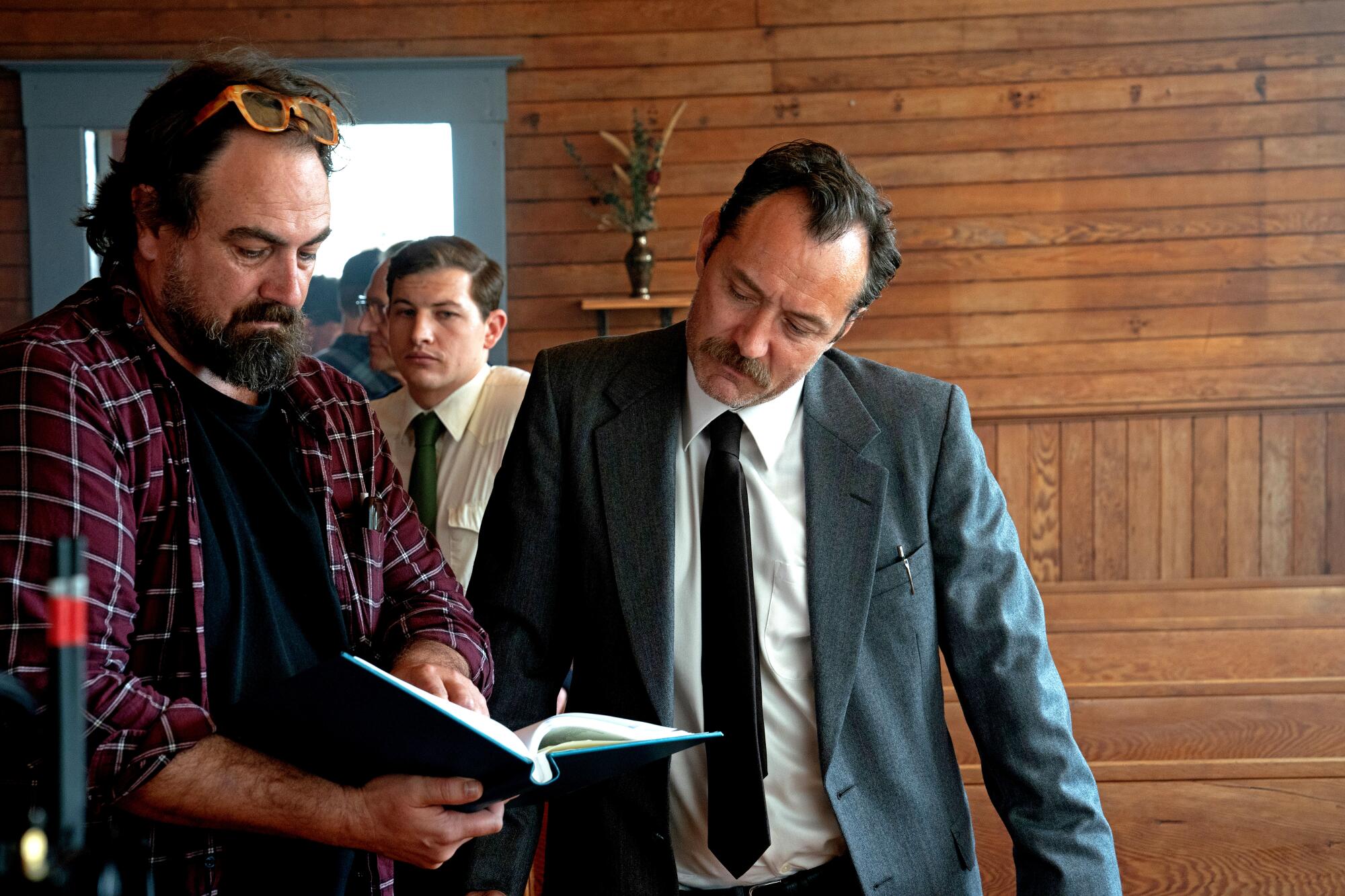- Share via

When Jude Law and Justin Kurzel set out to make “The Order,” a period piece about neo-Nazis in the Pacific Northwest, they couldn’t have known that the events of the early 1980s would be as timely as they are today. Yes, groups such as the Proud Boys and the Oath Keepers had been in the news from the 2017 “Unite the Right” rally in Charlottesville, Va., through the Jan. 6 insurrection in 2021, but the idea of an energized white power movement with tacit presidential approval had faded — until Donald Trump was reelected.
“We started developing the script, and then January 6 happened, and I’m seeing nooses outside the Capitol building, and there were pictures of people holding ‘The Turner Diaries,’” says director-producer Kurzel, referring to the 1978 novel that became a foundational text for white nationalists. “As we filmed and edited, and as the film played at festivals, it is interesting how it’s sort of sharpened up in terms of how much it’s speaking to the temperature at the moment.”
During the campaign, Trump himself vowed to fight what he calls “anti-white feeling” in the U.S., and shortly after the election, the FBI said it was investigating threatening text messages sent to Black Americans, Latinos and people in the LGBTQ+ community around the country.
Based on a true story, “The Order” stars Law as Terry Husk, an FBI agent sent to Coeur d’Alene, Idaho, in 1983 to investigate a string of bank robberies. He soon discovers they’re tied to a group called the Order, a splinter sect of the Aryan Nations led by Bob Mathews (Nicholas Hoult), a firebrand bent on a takeover of the U.S. government.

“It’s important to say it didn’t start with Bob Mathews,” notes Law, who produced the film through his Riff Raff Entertainment banner. “Nor did it end with him. This is a social issue that’s been going on for years and years and years. How do we deconstruct a world to stop it from happening? Is there a way? What does it take to defy them, to break them down? You can start with basic answers like education and employment. It usually starts with the blame game and one side having what others don’t and who has more money.”
Husk is a composite of the many law enforcement officials who took part in the investigation, a fictional character with whom the filmmakers could paint a portrait that would dramatically contrast with the real-life Mathews.
“We talked about damaging him and having him be under par,” Law says about Husk’s surgical scars, nosebleeds, prescription drugs and heavy drinking. “It’s important that Mathews underestimate him. And to do that, I wanted him to be busted, like, ‘Is this guy going to make it through the afternoon, let alone solve the case?’”
As Mathews, Hoult sports an unseemly Dutch-boy haircut masking steely determination. With leading-man good looks and sharp comedic timing, Hoult has only recently turned to his inner demons for inspiration, playing Lex Luthor in James Gunn’s upcoming reimagined “Superman.” As Mathews, he displays a charismatic pull that draws disaffected young men into the Order.
“We understand the danger in him. But why is he surrounded by kids?” wonders Kurzel. “Why is he surrounded by people that gravitate to him? Why is he having barbecues, what is that pull?”
‘What I enjoy doing is trying to disappear and not do the same thing over and over again,’ says the actor with three recent releases: ‘Juror #2,’ ‘The Order’ and ‘Nosferatu.’
It’s a question that resonates today as young men are increasingly drawn toward toxic male figures. “It wasn’t so long ago [when] it was a heavily male-dominated society,” says Law. “Women would probably say it still is, and it probably still is, unfairly, but it’s left young men feeling vulnerable. And vulnerable minds and hearts and bodies are easy to prey on. We’re driven by testosterone, which is easier to trigger. You set up a climate of haves and have-nots, and there’s a natural male need to have and to provide.”

A two-time Oscar nominee (“The Talented Mr. Ripley” and “Cold Mountain”), Law has several projects in the works: Upcoming films include “Eden,” co-starring Vanessa Kirby, Ana de Armas and Sydney Sweeney, and he’s currently in preproduction on Olivier Assayas’ “The Wizard of the Kremlin” with Alicia Vikander, as well as “Sherlock Holmes 3,” in which he’ll reprise his role of Watson. He can be seen now in “Star Wars: Skeleton Crew” on Disney+, and next year in “Black Rabbit,” a Netflix miniseries Riff Raff produced. It was through that project that he met “The Order” screenwriter Zach Baylin and his wife, Kate Susman, who are its showrunners. (Kurzel directed two episodes of “Black Rabbit.”)
“The last couple of things I had that came out recently were delayed because of the [actors’] strike,” says Law about the sudden flurry of activity. “I’ve been fortunate enough to be asked to do some interesting work, and ‘Black Rabbit’ was something that came out of my production company. So I was excited to also be able to steer a piece I really believed in and wanted it to happen.”
More to Read
From the Oscars to the Emmys.
Get the Envelope newsletter for exclusive awards season coverage, behind-the-scenes stories from the Envelope podcast and columnist Glenn Whipp’s must-read analysis.
You may occasionally receive promotional content from the Los Angeles Times.











